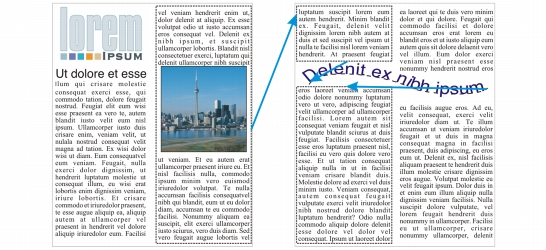
Quick links to procedures on this page:
• |
• |
• |
• |
• |
You can combine text frames. You can also break text frames apart into subcomponents — columns, paragraphs, bullets, lines, words, and characters. Every time you break apart a text frame, the subcomponents are placed into separate text frames.
Linking text frames directs the overflow text of one text frame to another. If you resize a linked frame, or change the size of the text, the amount of text in the next frame is automatically adjusted. You can link text frames before or after you type text.
You cannot link artistic text. However, you can link a paragraph frame to an open or closed object. When you link a frame to an open object, such as a line, the text flows along the path of the line. Linking a text frame to a closed object, such as a rectangle, inserts a text frame and directs the flow of text inside the object. If text exceeds the open or closed path, you can link the text to another frame or object. You can also link to existing frames and objects across pages or create a linked frame in the same location on another page.
After linking text frames, you can redirect the flow from one object or text frame to another. When you select the text frame or object, a blue arrow indicates the direction of the text flow. You can hide or display these arrows.

You can make text flow between text frames and objects by linking the text.
You can remove links between multiple frames, and between frames and objects. When you have only two linked frames and you remove the link, the overflow text is merged back into the first frame. Removing the link from a frame that is part of a series of linked frames redirects the text flow into the next frame or object.
By default, paragraph formatting, such as columns, drop caps, and bullets, is applied to the selected text frames only. However, you can change your settings so that formatting is applied to all linked text frames, or to all selected and subsequently linked text frames. For example, if you apply columns to the text in one frame, you can choose whether to apply columns to the text in all the linked frames.
| To combine or break apart paragraph text frames |
1. |
Select a text frame.
|
If you are combining text frames, hold down Shift, and use the Pick tool
|
2. |
Click Arrange, and click one of the following:
|
• |
Combine
|
• |
Break apart
|
Text frames with envelopes, text fitted to a path, and linked text frames cannot
be combined.
|
If you first select a text frame with columns, the combined text frame will have
columns.
|
| To link paragraph text frames and objects |
1. |
Using the Text tool
|
2. |
Click the Text flow tab
|
If the text frame cannot hold all the text, the tab contains an arrow
|
3. |
When the pointer changes to a Link to pointer
|
• |
To link to a frame or object on the same page, click the text frame or object into
which you want to continue the text flow.
|
• |
To link to an existing frame or object on a different page, click the corresponding
Page tab on the document navigator, and then click the text frame or object.
|
• |
To create a new linked frame on another page, click the corresponding Page tab
on the document navigator, and hover over the area of the drawing page that
corresponds to the position of the first frame. When a preview of the frame
appears, click to create the linked frame. The new frame has the same size and
position as the original frame. If you click elsewhere on the page, the text frame
that is created is the size of the entire page.
|
If a text frame is linked, the Text flow tab changes
|
To link text frames successfully, you have to make sure that the automatic
sizing of frames is disabled. For more information, see To add paragraph text.
|
| To redirect text flow to a different text frame or object |
1. |
Using the Pick tool
|
2. |
Select the new frame or object into which you want the text flow to continue.
|
| To remove links between text frames or objects |
• |
Right-click a linked frame, and click Undo link paragraph text frames.
|
You can disconnect linked frames on different pages only if they are on facing
pages.
|
You can also remove links by clicking a text frame, and then clicking Arrange
|
| To specify formatting preferences for text frames |
1. |
Click Tools |
2. |
In the Workspace list of categories, double-click Text, and click Paragraph text
frame.
|
If you want to hide or display the text flow indicators, disable or enable the Show linking of text frames check box. |
3. |
In the Apply paragraph frames formatting area, enable one of the following
options:
|
• |
To all linked frames — applies paragraph formatting to selected text frames
and all text frames that are linked to them
|
• |
To selected frames only — applies paragraph formatting to the selected text
frames only
|
• |
To selected and subsequent frames — applies paragraph formatting to
selected text frames and any text frames that are later linked to them.
|
|
|
Copyright 2012 Corel Corporation. All rights reserved.